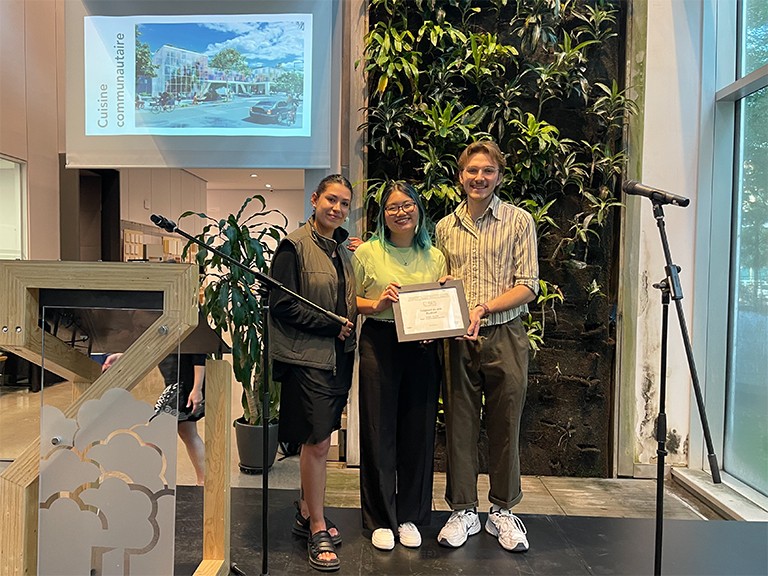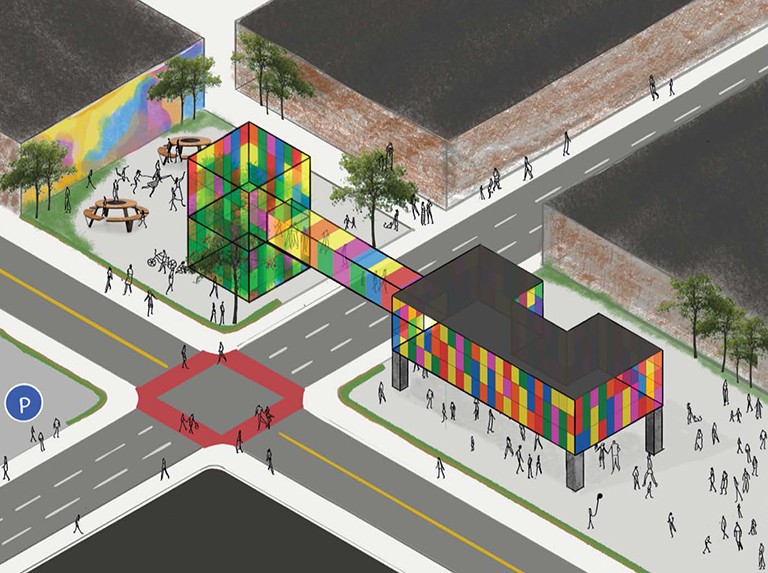Concordia students win a sustainable design competition with their community kitchen and greenhouse concept
 Concordia design student Mélodie Ah-Waye with team members Kamila Nina Andersen and Quentin Meilhon.
Concordia design student Mélodie Ah-Waye with team members Kamila Nina Andersen and Quentin Meilhon.
Not everyone will look at a parking lot and picture a greenhouse and collective kitchen in its place.
But for Concordia design students Kamila Nina Andersen, Mélodie Ah-Waye and Quentin Meilhon, such a proposal won them the Student Award and $1,000 at the inaugural CASES competition this September. The local sustainability-focused competition was organized by the Conseil régional de l’environnement de Montréal (CRE-Montréal).
CASES calls on participants to reimagine existing on-and off-street parking areas in Montreal to better respond to the community’s social, economic and environmental needs.
The winning concepts were unveiled at the Maison du développement durable on September 15, as part of J’embarque! dans les rendez-vous de la mobilité durable.
The three undergrads, dubbed Eco Trio, won for their proposed transformation of two existing parking lots near the Frontenac metro station. Their concept returns the public space to the neighbourhood by encouraging sustainable practices and community building.
“As designers, it was very important for us to create an inclusive environment where people would feel safe and accepted,” Ah-Waye shares. “Concordia’s Le Frigo Vert and the People’s Potato were inspirations for our idea of a self-sustained communal kitchen.”
For Andersen, the CASES competition opened the door to new possibilities. “I’m glad we participated. It made me aware of all the opportunities young designers have to contribute to society,” she says.
 Eco Trio’s winning concept.
Eco Trio’s winning concept.
A hands-on approach to sustainable design
Andersen, Ah-Waye and Meilhon developed their concept as part of an end-of-year assignment for Design History and Sustainability (DART 263). The course is taught by Carmela Cucuzzella, professor of design and computation arts and Concordia University Research Chair in Integrated Design, Ecology and Sustainability for the Built Environment.
“During the brainstorming process, Professor Cucuzzella and our TA helped us substantially by guiding our ideas in the right direction while still giving us a lot of space to explore different concepts,” Andersen recalls. “Their advice encouraged us to create something conversational and reminded us that we shouldn’t consider any idea ‘too big.’”
Design History and Sustainability uses a hands-on approach to learning through course-integrated competitions. These real-world experiences exemplify Concordia’s commitment to providing all students with experiential learning opportunities.
Cucuzzella emphasizes the impact competitions like CASES can have on students.
“It is extraordinary for first-year students to feel that they can contribute to the betterment of society,” she says. “Students gain knowledge and the confidence to submit their ideas to external competitions and calls for ideas.”
It’s an approach that’s proving successful. Eco Trio’s win marks the fourth time students from the course have received top honours at an external design competition.
“As a design student, I had such a valuable learning experience through this project,” Meilhon says. “And working alongside my peers, who are equally as passionate, made it even better.”
Next-gen cities: urban design through the lens of sustainability
For Ah-Waye, the competition has her looking to the future and her role as a designer. “Being a part of this competition has motivated me to continue the collective journey to innovate urban areas and advance green practices,” she says.
Cucuzzella, who is also the founding co-director of Concordia’s Next-Generation Cities Institute, underlines the strength of the team’s achievements:
“Eco Trio’s project brought together social issues — cost of food; environmental concerns —materials and energy; and cultural considerations — spaces for gatherings and events; into a clear, integrated approach.”
She adds that the CASES competition’s aim, to spark reflection and rethinking of urban spaces, is closely aligned with the institute’s innovative and collaborative research to transform cities into sustainable, resilient and inclusive communities.
View ECO Trio’s winning CASES competition concept.
Learn more about Concordia’s next-gen approach to cities and experiential learning.




